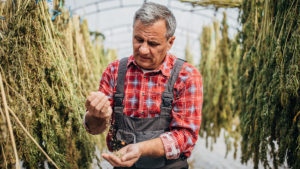Cannabis consolidation is swirling but AusCann isn’t on the market, says MD

Not for sale yet. Pic: Getty
Medical marijuana play AusCann isn’t a takeover target yet, says its managing director Elaine Darby.
With speculation around market consolidation beginning to swirl this year, Australia’s #2 pot stock has the early-mover advantages, size and major shareholder to spur speculation.
Last week there was a double takeover by Queensland Bauxite which bought the remainder of Medical Cannabis Ltd.
And industry insiders tell Stockhead Australia’s largest pot stock Cann Group (ASX:CAN) may be acquired by its biggest shareholder, Canadian Aurora, by the end of the year.
But Ms Darby told Stockhead AusCann has had no discussions with Canopy around an acquisition.
She says they’re positioning themselves more as a drug manufacturer so expects any future bids to come instead from the pharmaceuticals industry, rather than cannabis growers.
Canopy is Canada’s largest cannabis company and AusCann’s (ASX:AC8) biggest shareholder with just over 10 per cent.
AusCann was the second listed cannabis company to receive a growing permit, which allows them to actually start growing marijuana, and is the other company on the ASX alongside Cann that is in advanced stages towards setting up its own Australian growing base.
- Bookmark this link for small cap breaking news
- Discuss small cap news in our Facebook group
- Follow us on Facebook or Twitter
- Subscribe to our daily newsletter
Australian cannabis companies have received considerable help and intellectual property from Canada, where companies have already gone through the trial and error process to turn cannabis from amateur to commercial drug.
There are expectations that once Aussie pot stocks begin to prove themselves commercially, offers are likely to come from foreign companies wanting a toehold in Australia.
Canopy is providing considerable assistance to AusCann for its 10 per cent stake, through cannabis oil supply and distribution agreements.
Further, AusCann’s new master cannabis grower Luke Pigeau is a man who has worked for two companies acquired by Canopy.
AusCann CEO Elaine Darby says Mr Pigeau cut his teeth as a small scale grower, then when the Canada market opened he moved up to Mettrum Health and Agripharm.
They were bought by Canopy Growth in 2016 and 2017 respectively.
Growing operations
AusCann is also deepening its Canadian footprint with an agreement with Jade Cannabis. The agreement is for three years of R&D into increasing the yield per square metre of a grow room.
Jade Cannabis’ cofounder Kenneth Langford designed a system able to deliver a crop every two weeks from four grow rooms when he was working for Peace Naturals.
Ms Darby says they will start growing at their Tasmanian location by the end of the year, and the crop with go directly to drug manufacturer Tasmanian Alkaloids for drug production.
The Canada factor
Canopy could put AusCann in something of a tight spot though: it’s lobbying in Australia for recreational use.
Australia’s growers are carefully promoting their local ambitions to fend off suggestions they’re looking to supply more profitable, mature markets like Canada than Australia’s infant market.
Companies must toe the line if they want to keep their all-important licences or permits, if they have them, as AusCann does.
A licence allows companies to start the process of building facilities capable of farming cannabis, a permit allows them to start growing it.
Ms Darby says so far it’s a non-issue because the two companies have gone in different directions since they forged the partnership, with AusCann looking more closely at the pharmaceuticals industry.
UNLOCK INSIGHTS
Discover the untold stories of emerging ASX stocks.
Daily news and expert analysis, it's free to subscribe.
By proceeding, you confirm you understand that we handle personal information in accordance with our Privacy Policy.








